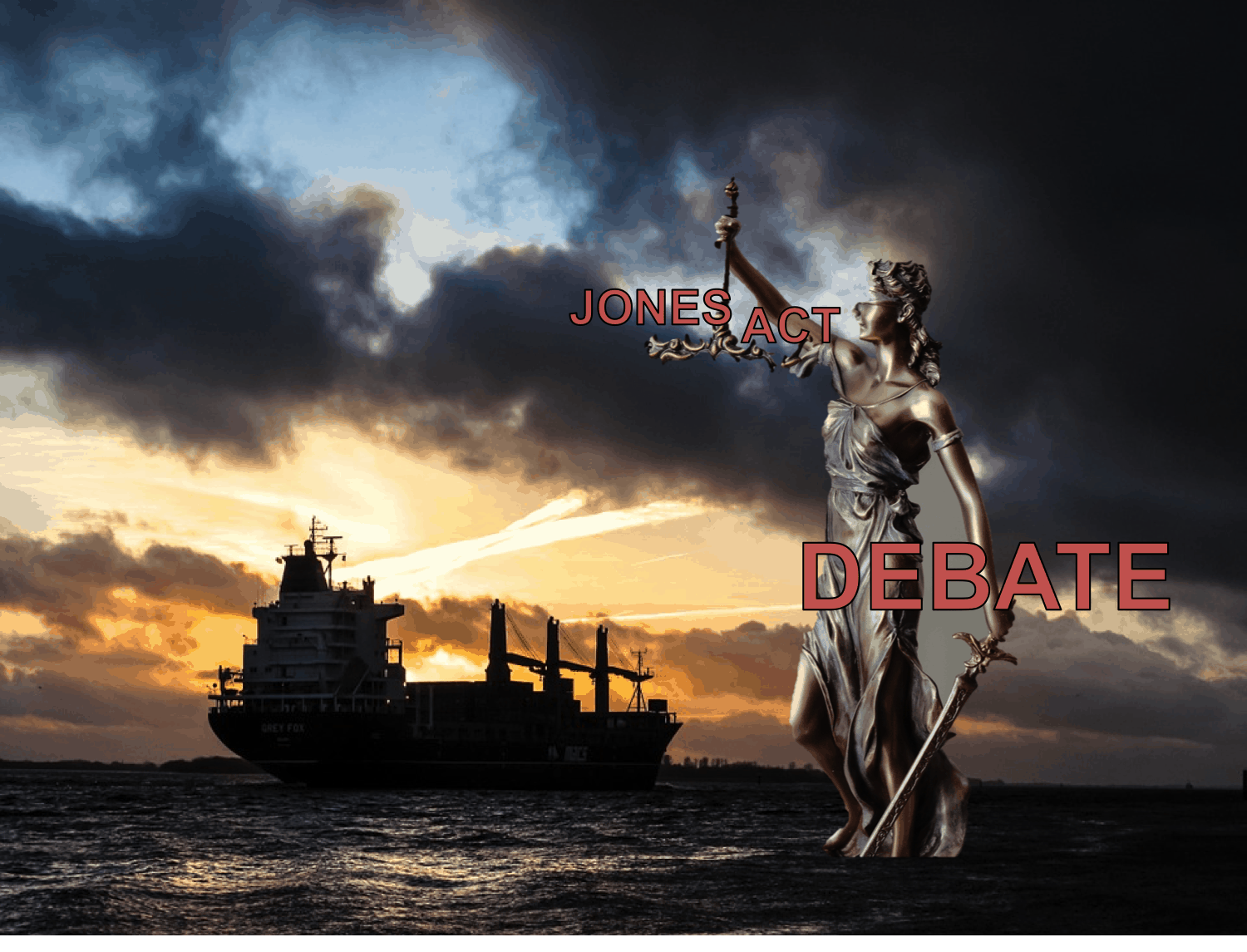The Jones Act Debate Part 5: Disaster Relief
The Jones Act debate often flairs up during times of natural disaster in the U.S., particularly when that natural disaster hits a noncontiguous state or territory, such as Puerto Rico. As a matter of fact, the subject went viral a few years ago after Hurricane Maria hit Puerto Rico in 2017. There were plenty of angry tweets and Facebook posts about the Jones Act hindering aid to Puerto Rico. Others posted about those claims being off base.

Today’s post, continuing the Jones Act debate series, will lay out the arguments for whether or not the Jones Act hurts disaster relief.
First, here’s what we’ve covered so far:
President Biden Supports the Jones Act – What Is It and What Does It Do?
The Jones Act Debate Part 1: National Security
The Jones Act Debate Part 2: Protectionism or Hindrance
The Jones Act Debate Part 3: Cost to Hawaii
The Jones Act Debate Part 4: Puerto Rico
As per usual, I’ll state that this series is not meant to take a side but merely present arguments proponents and opponents of the Jones Act make to help you on your way to deciding where you stand in the debate.
The Back and Forth About Jones Act Hindering Disaster Relief
Opponents of the Jones Act say it hinders recovery efforts after natural disasters (and sometimes man-made ones like oil spills). This is going to overlap with the last part of this series, as Puerto Rico’s recovery from Hurricane Maria took center stage in this debate in 2017 and continues to garner passionate social media posts to this day.
In ’17, the debate got heated, as all politically related topics seem to do in recent years, especially when there’s an opportunity to call a political opponent racist during it. However, if you could maneuver your way through accusations of racism, you might find a back and forth something like this:
“The Jones Act limits recovery supplies from getting to Puerto Rico.”
“The supplies are getting there, but they’re stuck at the ports because Puerto Rico’s infrastructure is the real problem.”
To be honest, despite many, many articles and posts about how the Jones Act hurt the recovery of Puerto Rico, I found very little in terms of depth and evidence to support the assertion. Usually, people quickly pivoted to the arguments that shipping to Puerto Rico is more expensive because of the Jones Act, which is a serious debate worth considering that is well-covered in Part 4 of this series.
Opponents of Jones Act Point to Oil & Fuel Shipping Hurting Puerto Rico’s Recovery
After Hurricane Maria, there was a bottleneck of recovery supplies at the ports in Puerto Rico, as Jones Act proponents say, but perhaps the best arguments on the other side are about the Jones Act making it difficult to get American oil and fuel to Puerto Rico increased the cost and time of the recovery.
James W. Coleman, professor at Southern Methodist University’s Dedman School of Law, wrote in an opinion article published by Fox News titled Repeal the Jones Act to speed Puerto Rico recovery:
Puerto Rico is in trouble. Nearly 85 percent of the island’s 3.4 million American citizens remain without electric power, water pumps on half the island aren’t working, and fuel and truck shortages are preventing food and supplies from being delivered to many areas. Authorities say it could take at least three and as many as six months to restore electricity to all residents.
The recovery of Puerto Rico could progress much more rapidly if the Jones Act was wiped off the books….
… Puerto Rico must import liquefied natural gas for its power plants, but there are no ships complying with the Jones Act large enough to transport that much gas from the U.S. Gulf Coast. Instead, Puerto Rico imports liquefied natural gas from Trinidad & Tobago. Low-cost gas from the mainland United States is sent to Asia, Europe, and South America instead, transported on the ships of other nations.
A year later, Mark J. Perry – American Enterprise Institute scholar and a professor of economics at the University of Michigan, Flint – wrote in an opinion article for the Hill that the Jones Act’s effect on shipping oil slowed recovery time while making it more expensive in Puerto Rico.
The Jones Act has raised the cost of transporting oil and gas to all U.S. domestic ports, but especially ports in the noncontiguous regions of Hawaii and Puerto Rico, which was devastated by a natural disaster in the form of Hurricane Maria a year ago this month. Inflated shipping costs due to the Jones Act were a secondary and avoidable man-made disaster for Puerto Rico that added to the costs of recovery and significantly slowed the recovery time.
Yes, those are generalities Perry speaks with, but they represent a very popular opinion. Finding analysis and specifics on how much recovery was slowed or how much more it cost because of the Jones Act is something I wasn’t able to find, despite going through many, many articles making the same assertions. If you have good evidence or sources for this, please share them in the comments section below.
It is certainly possible the Jones Act could hinder recovery efforts when shipping is needed. For that reason, and possibly for other political reasons too, the Jones Act has been waived under emergency circumstances a number of times. That’s something both sides of the debate can point to. One side can say if the Jones Act didn’t hurt recovery, it would never need to be waived. The other side could say when there is a disaster that the Jones Act might slow the response to, it can always be waived for that circumstance.
Is Jones Act Wrong Place to Look for Disaster Relief Problems?
Aaron Klein, Senior Fellow of Economic Studies for the Brookings Institution, argues in a Brookings article:
The feverish debate about whether to waive the Jones Act to expedite Puerto Rico’s disaster recovery was akin to considering what to do about a paper cut for a cancer patient. Its waiver was—and remains—irrelevant to the core humanitarian problems at hand and any needed reaction. The key problems, including insufficient and delayed federal resources, and a lack of means to distribute supplies on the island, have nothing to do with the Jones Act.
Klein thinks that while the opinion that the Jones Act hurt disaster relief in Puerto Rico is wildly popular, it is also wrong. He backs up this opinion with a comparison of needs between situations of waiving the Jones Act. While Klein does not dismiss the idea that Puerto Rico is treated differently as a commonwealth than states are, he points to reasons the decision of waiving the Jones Act in 2017 compared to earlier waivings of the legislation do not play into that:
After the speculation about the Jones Act’s supposed barrier to aid delivery spread virally online, the Department of Homeland Security was pressed by Rep. Nydia Valezquez (D-NY) to waive the Jones Act. Comparisons were made to prior waivers for hurricanes that landed in the continental states, fueling arguments that Puerto Rico was receiving second-class treatment. This fed into a broader narrative concerning whether Puerto Rico is more broadly treated equitably given its commonwealth status.
While that broad debate has great merit, focusing on the Jones Act component is wrong. It fails to appreciate the distinction between waivers based on oil and fuel shipping and cargo shipping. Those types of ships are not interchangeable and hurricanes to the Gulf Coast involved fuel and oil tanker shortages. As Keith Hennessy, director of the National Economic Council under President George W. Bush, stated regarding the waivers granted during Katrina and other times: “The direct benefits of a waiver were, in this case, small and diffuse. Waivers allowed 50K barrels per day here, and 100K barrels there, to arrive several days earlier than they would have otherwise. The waiver resulted in handfuls of short-term arrangements that moved fuel more expeditiously.” Puerto Rico, did not need oil tankers, nor were the problems about getting fuel to the port.
For Klein, the Jones Act debate as it pertains to disaster relief for Puerto Rico after Hurricane Maria was about the media and politicians being opportunistic with the disaster. If not repealing the Jones Act, where should people look for the good of Puerto Rico’s recovery? Klein concludes his article with this:
More broadly, those concerned with Puerto Rican disaster assistance in the short term, and how to restore the economy of Puerto Rico in the long term, should focus on the real economic problems. As my Brookings colleague Jason Miller correctly argues, this requires a long-term, sustained commitment of economic resources and assistance to the Commonwealth. It may also require rethinking the sustainability of the island as a commonwealth, or whether it should join the United States as the 51st state. Puerto Rico should not be used to press a long-standing economic debate regarding where to draw the line in which parts of our nation’s economy and military security are opened up to foreign competition. Critics of the President [President Trump at the time of his writing] and those who wish to show support for a stronger disaster recovery ought to think twice before retweeting or Facebooking an enticing headline purporting to link obscure laws to topical disasters. They may be inadvertently supporting policies they actually oppose.
Concluding the Jones Act Debate
We can’t end a debate that has been raging on for a century, but we can end the blog series covering it. While there are more arguments we could cover in this series, I believe we’ve hit the most talked about ones. We’ll do one last post on this series that quickly lists the arguments so you have them in one place for easy reference, then we’ll bid the topic adeaui – at least until it pops up in the news in a very significant way.



